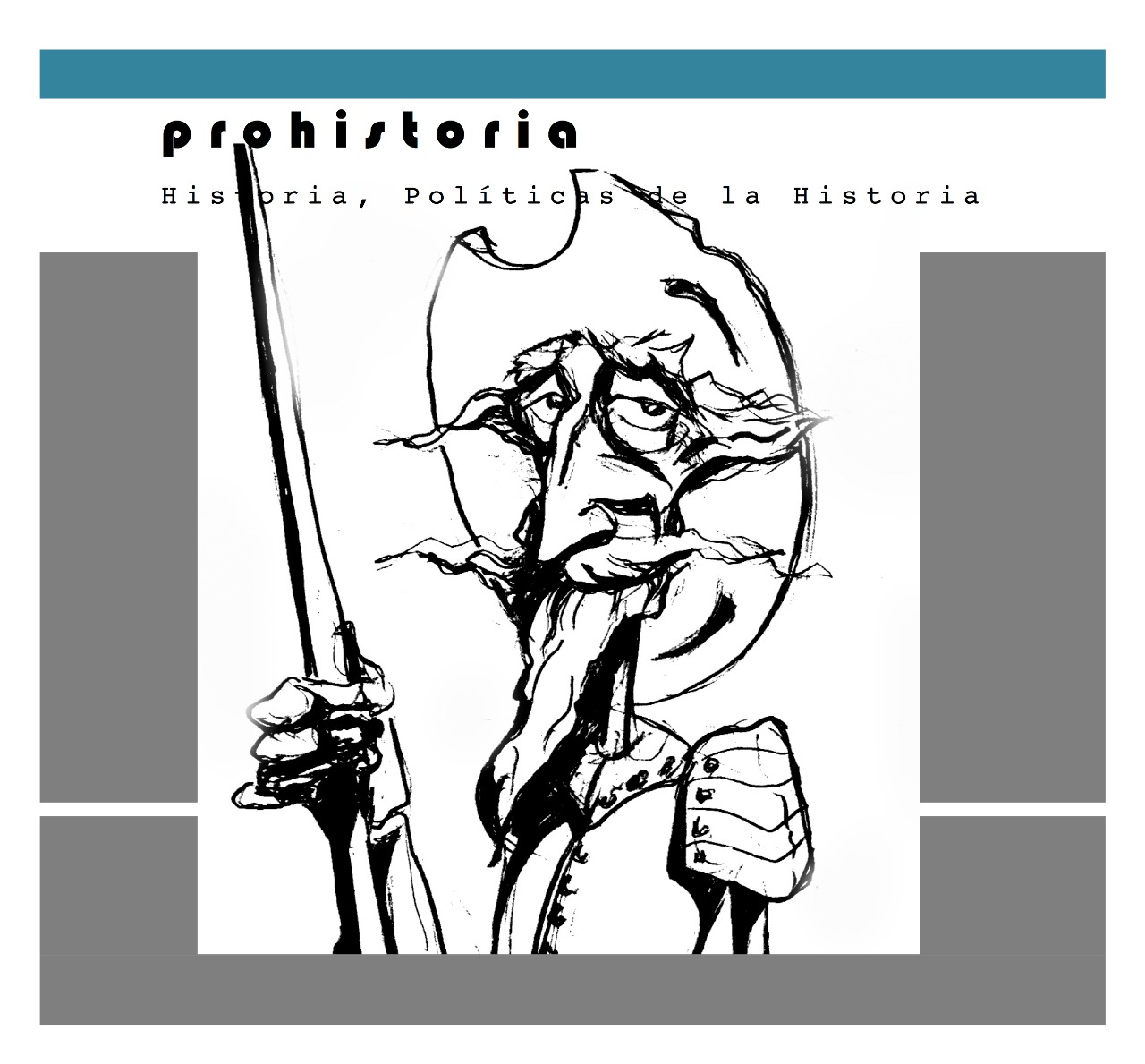State of Law or Free State?
The Constitutional Experience of the French Revolution
DOI:
https://doi.org/10.35305/prohistoria.vi40.1800Keywords:
French Revolution, State of Law, Free State, Constitution of 1791, Constitution of 1793Abstract
This article aims to explore the theoretical and political differences between classical republicanism and modern liberalism by analyzing the concepts of the “state of law” and the “free state” as they were developed by the constitutional thought during the French Revolution. The analysis thus begins by specifying the terms in which legal thought has interpreted the Constitution of 1791 as the founder of the rule of law in France. The circumstances leading to the failure of the Constitution of 1791 are analyzed next, to then examine how the radical factions coped with the political experience of 1789-1792. Finally, the constitutional projects of 1793 are analyzed as a response to the issues identified by the radicals as having caused the political crisis of the summer of 1792 that had ended in the popular storming of the Tuileries.
Downloads
References
Alengry, Fr. (1904). Condorcet, guide de la Révolution française, théoricien du Droit constitutionnel et précurseur de la Science sociale. Giard et Brière.
Ankersmit, Fr. R. (2002). Political Representation. Stanford University Press.
Ansart, G. (2009). Condorcet, Social Mathematics, and Women’s Rights. Eighteenth-Century Studies, 42 (3), 347-362.
Baczko, B. (1989). Comment sortir de la Terreur. Thermidor et la Révolution. Gallimard.
Badinter E., y Badinter, R. (1988). Condorcet. Un intellectuel en politique. Fayard.
Baker, K. M. (1975). Condorcet: From Natural Philosophy to Social Mathematics. The University of Chicago Press.
Baker, K. M. (2001). Transformations of Classical Republicanism in Eighteenth-Century France. Journal of Modern History, 73 (1), 32-53.
Baker, K. M. (2006). Political Languages of the French Revolution. En M. Goldie y R. Wokler (Eds.), The Cambridge History of Eighteenth-century Political Thought (pp. 626-659). Cambridge University Press.
Bart, J.; et al. (Eds.) (1997). La Constitution du 24 juin 1793. L’utopie dans le droit public français? Éditions Universitaires de Dijon.
Beaud, O. (2009). L’histoire du concept de constitution en France. De la constitution politique à la constitution comme statut juridique de l’Etat. Jus Politicum, (3). URL: http://juspoliticum.com/article/L-histoire-du-concept-de-constitution-en-France-De-la-constitution-politique-a-la-constitution-comme-statut-juridique-de-l-Etat-140.html.
Bell, D. A. (2002). Le caractère national et l’imaginaire républicain au XVIIIe siècle. Annales HSS, 57 (14), 867-888.
Benrekassa, G.; y Ehrard, J. (Eds.) (1989). Montesquieu et la Révolution, 1689, 1789, 1989. Dix-huitième siècle, (21), 5-186.
Bergeron, L.; Furet, Fr.; y Koselleck, R. (1969). Das Zeitalter der europäischen Revolution, 1780-1848. Fischer.
Berlin, I. (1969). Two Concepts of Liberty. En Id., Four Essays on Liberty (pp. 118-172). Oxford University Press.
Biral, A. (1999). Rivoluzione e costituzione: la costituzione del 1791. En A. Biral, Storia e critica della filosofia politica moderna (pp. 207-225). Franco Angeli.
Bredin, J.-D. (1988). Sieyès. La clé de la Révolution française. Fallois.
Brunori, L. (2020). La personne du roi inviolable et sacrée. Principes et procédures entre Révolution et Restauration. En G. Meylan (Ed.), Sacré et responsabilité́ (pp. 117-130). Mare & Martin.
Carré de Malberg, R. (1920-1922). Contribution à la théorie générale de l’État. 2 tomos. Sirey.
Chisick, H. (2017). Of Radical and Moderate Enlightenment. En S. Ducheyne (Ed.), Reassessing the Radical Enlightenment (pp. 61-79). Routledge.
Cormack, W. S. (2018), Defending the Liberal Revolution in France: Provincial Reactions to the Parisian journée of 20 June 1792. Canadian Journal of History/Annales canadiennes d’histoire, 53 (2), 233-253.
Craiutu, A. (2012). A Virtue for Courageous Minds: Moderation in French Political Thought, 1748-1830. Princeton University Press.
Crook, M. (1996). Elections in the French Revolution: An Apprenticeship in Democracy, 1789-1799. Cambridge University Press.
Dawson, H. (2022). Liberty before License in Locke. En H. Dawson y A. de Dijn (Eds.), Rethinking Liberty before Liberalism (pp. 60-76). Cambridge University Press.
Dendena, Fr. (2013). I nostri maledetti scranni. Il movimento fogliante tra la fuga di Varennes e la caduta della monarchia, 1791-1792. Guerini.
Doyle, W. (2022). Robespierre: A Reluctant Terrorist? The Historian, (154), 22-25.
Duso, G. (1999). Storia concettuale come filosofia politica. En G. Duso, La logica del potere. Storia concettuale come filosofia politica (pp. 3-34). Laterza.
Dyzenhaus, D. (2012). Hobbes on the Authority of Law. En Id. y T. Poole (Eds.), Hobbes and the Law (pp. 186-209). Cambridge University Press.
Dyzenhaus, D. (2015). Freedom Under an Order of Public Law: From Hobbes Through Hayek to Republicanism. En R. Uitz (Ed.), Freedom and Its Enemies: The Tragedy of Liberty (pp. 79-105). Eleven.
Fitzsimmons, M. P. (1994). The Remaking of France: The National Assembly and the Constitution of 1791. Cambridge University Press.
Fontana, B. (1994). The Thermidorian Republic and Its Principles. En Id. (Ed.), The Invention of the Modern Republic (pp. 118-138), Cambridge University Press.
Furet, Fr. (1991). Les Girondins et la guerre: les débuts de l’Assemblée législative. En Fr. Furet y M. Ozouf (Eds.), La Gironde et les Girondins (pp. 189-232). Payot.
Furet, Fr.; y Halévi, R. (1996). La Monarchie républicaine. La Constitution de 1791. Fayard.
Gauchet, M. (1989). La Révolution des droits de l’homme. Gallimard.
Glénard, G. (2010). L’Exécutif et la Constitution de 1791. Presses Universitaires de France.
Goulemot, J.-M. (1993). Du républicanisme et de l’idée républicaine au XVIIIe siècle. En Fr. Furet y M. Ozouf (Eds.), Le Siècle de l’avènement républicain (pp. 25-56). Gallimard.
Grieder, J. (1985). Anglomania in France, 1740-1789: Fact, Fiction and Political Discourse. Droz
Gueniffey, P. (1994). Cordeliers et girondins: la préhistoire de la république? En Fr. Furet y M. Ozouf (Eds.), Le Siècle de l’avènement républicain (pp. 197-224). Gallimard.
Hampson, N. (1983). Will and Circumstance: Montesquieu, Rousseau and the French Revolution. Duckworth.
Hartog, Fr. (1991). Liberté des anciens, liberté des modernes: La révolution française et l’antiquité. En R. Pol-Droit (Ed.), Les Grecs, les Romains et nous. L’antiquité est-elle moderne? (pp. 119-141). Le Monde.
Heuschling, L. (2021). État de droit: The Gallicization of the Rechtsstaat. En J. Meierhenrich y M. Loughlin (Eds.), The Cambridge Companion to the Rule of Law (pp. 68-85). Cambridge University Press.
Jainchill, A. (2008). Reimagining Politics after the Terror: The Republican Origins of French Liberalism. Cornell University Press.
Jaume, L. (1989). Le Discours jacobin et la démocratie. Fayard.
Jaume, L. (1991). Le jacobinisme et J.-J. Rousseau: influence ou mode de légitimation? En J. Roy (Ed.). Jean-Jacques Rousseau et la Révolution (pp. 57-69). Association nord-américaine des études Jean-Jacques Rousseau.
Jaume, L. (2005) Condorcet: droit de résistance ou censure du peuple? Le Genre humain, (44), 59-71.
Jaurès, J. (1922-1924). Histoire socialiste de la Révolution française. 8 tomos. Librairie de L´Humanité.
Jouanjan, O. (2003). État de droit. En D. Alland y S. Rials (Eds.), Dictionnaire de la culture juridique (pp. 649-653). Presses Universitaires de France/Lamy.
Kalyvas, A.; y Katznelson, I. (2008). Liberal Beginnings: Making a Republic for the Moderns. Cambridge University Press.
Kantorowicz, E. H. (1957). The King’s Two Bodies: A Study in Mediaeval Political Theology. Princeton University Press.
Koselleck, R. (1973). Kritik und Krise. Eine Studie zur Pathogenese der bürgerlichen Welt. Suhrkamp.
Koselleck, R. (1979). Vergangene Zukunft. Zur Semantik geschichtlicher Zeiten. Suhrkamp.
Krause, Sh. R. (2021). The Rule of Law in Montesquieu. En J. Meierhenrich y M. Loughlin (Eds.), The Cambridge Companion to the Rule of Law (pp. 137-152). Cambridge University Press.
Larmore, Ch. (2004). Liberal and Republican Conceptions of Freedom. En D. Winstock y Ch. Nadeau (Eds.), Republicanism: History, Theory and Practice (pp. 83 103). Frank Cass.
Lefebvre, G. (1932). La Grande peur de 1789. Armand Colin.
Magrin, G. (2001). Condorcet: Un costituzionalismo democratico. Franco Angeli.
Mathiez, M. (1928). La Constitution de 1793. Annales historiques de la Révolution française, (30), 497-521.
Meierhenrich, J. (2021). Rechtsstaat versus the Rule of Law. En J. Meierhenrich y M. Loughlin (Eds.), The Cambridge Companion to the Rule of Law (pp. 39-67). Cambridge University Press.
Merryman, J. H. (1996). The French Deviation. American Journal of Comparative Law, 44 (1), 109-119.
Michon, G. (1924). Essai sur l’histoire du parti feuillant. Adrien Duport. Payot.
Mitchell, C. J. (1988). The French Legislative Assembly of 1791. Brill.
Mockle, D. (1994). L’État de droit et la théorie de la rule of law. Les Cahiers de Droit, 35 (4), 823-904.
Monnier, R. (2003). Républicanisme et révolution française. French Historical Studies, 26 (1), 87-118.
Ozouf, M. (1988). Liberté. En Fr. Furet y M. Ozouf (Eds.), Dictionnaire critique de la Révolution française (pp. 763-775). Flammarion.
Pasquino, P. (1998). Sieyès et l’invention de la constitution en France. Odile Jacob.
Pech, L. (2004). Rule of Law in France. En R. Peerenboom (Ed.), Asian Discourses of Rule of Law: Theories and Implementation of Rule of Law in Twelve Asian Countries, France and the U.S. (pp. 76-108). Routledge.
Pettit, Ph. (1999). Republicanism: A Theory of Freedom and Government. Oxford University Press.
Quilliet, B. (1993). Le thème du ‘Bon Roi’ au XVIIIe siècle. L’exemple de Louis XII. En R. Bourderon (Ed.), Saint-Denis ou le jugement dernier des rois (pp. 21-29). Éditions PSD.
Reinhard, M. (1969). La Chute de la Royauté, 10 août 1792. Gallimard.
Rials, S. (1988). La Déclaration des droits de l’homme et du citoyen. Hachette.
Sagnac, Ph. (1909). La Révolution du 10 août 1792. La chute de la royauté. Hachette.
Sellers, M. N. S. (1998). The Sacred Fire of Liberty: Republicanism, Liberalism, and the Law. Macmillan.
Sellers, M. N. S. (2014). The Roman Republic and the French and American Revolutions. En H. I. Flower (Ed.), The Cambridge Companion to the Roman Republic (pp. 401-418). Cambridge University Press.
Simon, P. (1987). Le Mythe royal. Amateurs des Livres.
Skinner, Q. (1998). Liberty Before Liberalism. Cambridge University Press.
Skinner, Q. (2008). Hobbes and Republican Liberty. Cambridge University Press.
Skinner, Q. (2022) On Neo-Roman Liberty: A Response and Reassessment. En H. Dawson y A. de Dijn (Eds.), Rethinking Liberty before Liberalism (pp. 233-266). Cambridge University Press.
Soboul, A. (1963). Jean-Jacques Rousseau et le jacobinisme. Studi Storici, 4 (1), 3-22.
Soreau, E. (1931). La loi Le Chapelier. Annales historiques de la Révolution française, (46), 287-314.
Sutherland, D. M. G. (2003). The French Revolution and Empire: The Quest for a Civic Order. Blackwell.
Sullivan, V. B. (2006). Machiavelli, Hobbes, and the Formation of a Liberal Republicanism in England. Cambridge University Press.
Swenson, J. (2000). On Jean-Jacques Rousseau: Considered as One of the First Authors of the Revolution. Stanford University Press.
Tackett, T. (2015). The Coming of the Terror in the French Revolution. The Belknap Press of Harvard University Press.
Terrel, J. (1997). Hobbes et le Républicanisme. Revue de Synthèse, 118 (2-3), 221-236.
Troper, M. (1988). L’interprétation de la Déclaration des droits: l’exemple de l’article 16. Droits, (8), 111-122.
Troper, M. (1992). The Development of the Notion of Separation of Powers. Israel Law Review, 26 (1), 1-15.
Troper, M. (1993). Le concept d’État de droit. Cahiers de philosophie politique et juridique, (24), 25-40.
Troper, M. (1996). La Constitution de l’an III ou la continuité: la souveraineté populaire sous la Convention. En R. Dupuy y M. Morabito (Eds.), 1795, pour une République sans Révolution. Presses Universitaires de Rennes.
Troper, M. (2006). Terminer la Révolution. La Constitution de 1795. Fayard.
Urbinati, N. (2004). Condorcet’s Democratic Theory of Representative Government. European Journal of Political Theory, 3 (1), 53-75.
Urbinati, N. (2022). Democratic Republicanism in the French Revolution. En S. S. Krause y D. Jörke (Eds.), Republicanism and Democracy: Close Friends? (pp. 189-219). Springer.
Vergara, C. (2021). Machiavelli’s Republican Constituent Power. En D. P. Aurélio y A. Santos Campos (Eds.), Machiavelli’s Discourses on Livy: New Readings (143-161). Brill.
Vergara, C. (2022). Republican Constitutionalism: Plebeian Institutions and Anti-Oligarchic Rules. Theoria, 69 (171), 25-48.
Vovelle, M. (1972). La Chute de la monarchie, 1787-1792. Le Seuil.
Wahnich, S. (2008). La longue patience du peuple: 1792, naissance de la première République. Payot.
Wolloch, N. (2022). Moderate and Radical Liberalism: The Enlightenment Sources of Liberal Thought. Brill.
Published
How to Cite
Issue
Section
License
Copyright (c) 2023 Pablo Escalante

This work is licensed under a Creative Commons Attribution-NonCommercial-ShareAlike 4.0 International License.
- Authors retain copyright and grant the journal right of first publication with the work simultaneously licensed under Creative Commons Attribution 4.0 International License.
- Authors are able to enter into separate, additional contractual arrangements for the non-exclusive distribution of the journal's published version of the work (e.g., post it to an institutional repository or publish it in a book), with an acknowledgement of its initial publication in this journal.
Copyright of this issue © Prohistoria. Historia, políticas de la historia



















